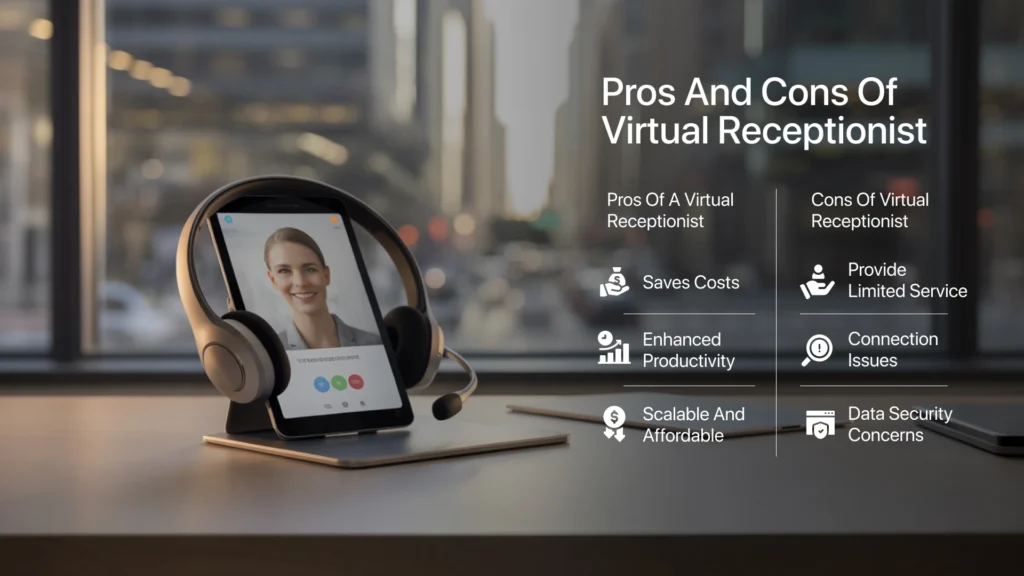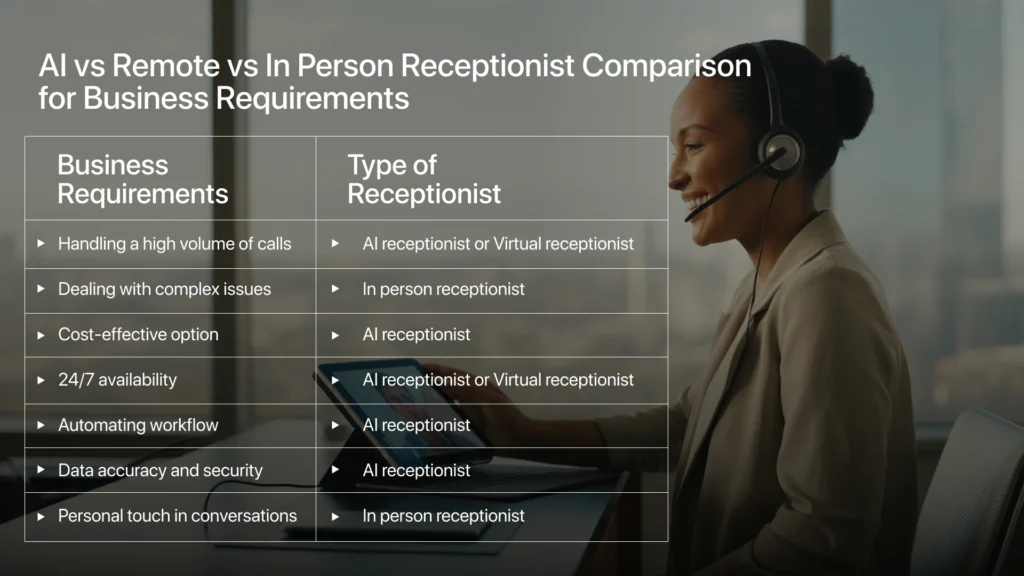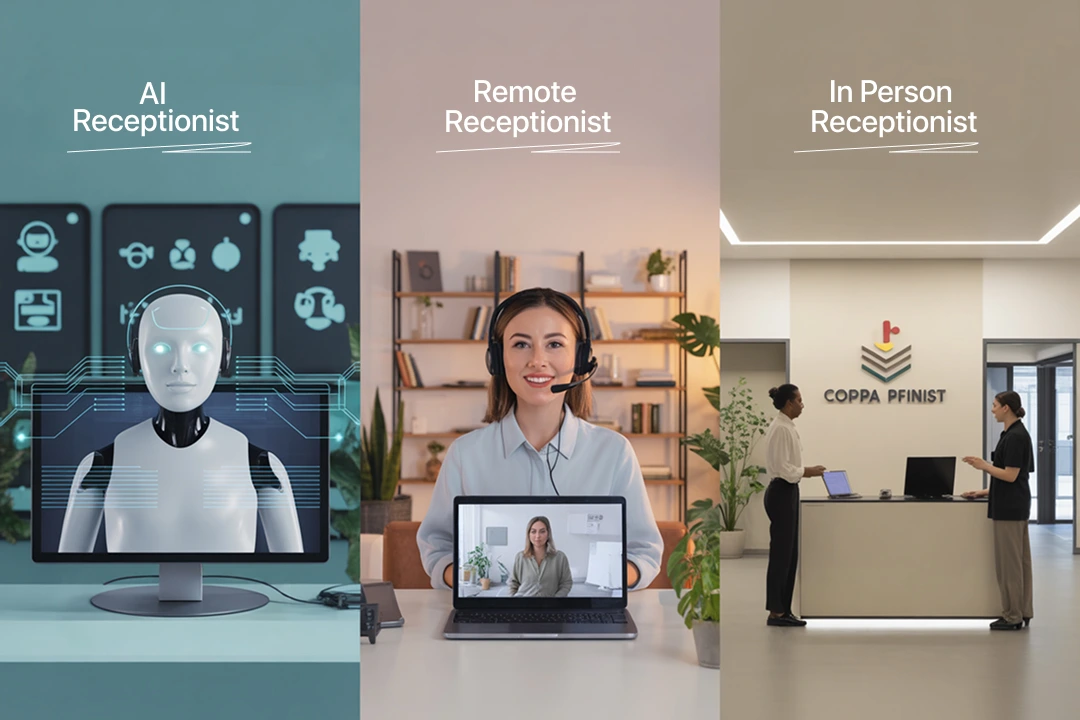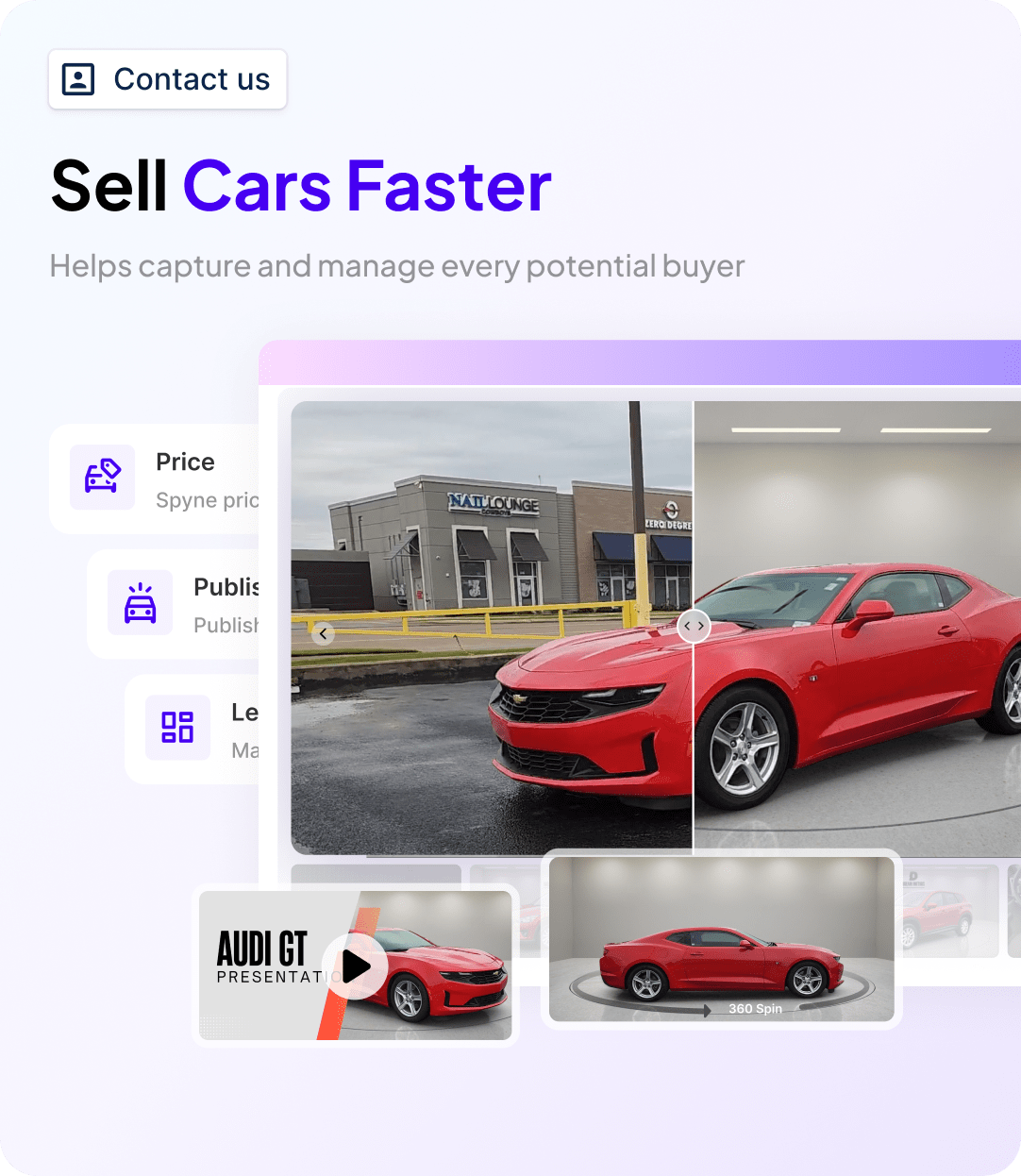When a customer contacts your business, it matters how they are initially attended to. A receptionist is responsible for welcoming visitors and customers, handling phone calls, and managing other administrative tasks of your business. But what kind of receptionist should you choose among AI vs remote vs in person receptionist? Each option has its pros and cons; it’s your responsibility to choose the right fit that aligns with your business goals and needs.
In this blog, we will explore the differences between the types of receptionists, the features that you need to consider, and why your business needs a virtual receptionist. The ultimate goal is to drive efficiency and productivity, regardless of which type of receptionist you choose.
What is an AI Receptionist?
An AI receptionist is a software that uses artificial intelligence to automate tasks like answering phone calls. These AI assistants use natural language processing (NLP) and machine learning to understand and respond to customer queries. They provide additional features like call routing, scheduling appointments, and providing quick responses to customers.
How is an AI Receptionist Different from Automated Systems?
Confusions are often created between AI vs remote vs in person receptionist. Most businesses misunderstand an AI receptionist with automated receptionist systems, but there is a difference between the two. An AI phone receptionist handles calls and offers personalized responses with the help of advanced intelligence, while automated systems have pre-recorded scripts for responding to customers.
Pros of an AI Receptionist
- Affordable Option: An AI receptionist pricing is not much, as it does not require salaries, benefits, training, or workspace, hence leading to cost savings for small businesses. They require only initial setup, and ongoing maintenance costs are also lower.
- Consistent Support: The AI phone receptionist remains available to respond to customers at all times of the day. It provides an after hours answering service to ensure you do not miss out on any leads.
- Ensures Scalability: They can handle large volumes of calls without needing to hire additional staff to handle calls.
- Same Experience Quality: Digital reception services ensure all customers get the same level of experience. They deliver personalized responses by maintaining your business tone.
- Minimal Errors: AI has advanced capabilities that minimize the chances of errors in data entry or other administrative processes.
- Effective Integrations: AI receptionists enable you to improve your BDC with CRM integrations and with other existing systems and communication platforms as well.
- Auto Updates: Since AI is an advanced technology, it is capable of auto-updating itself with the upcoming changes and trends, and making improvements for smooth workflow efficiency.
- Data-Driven Analytics: AI helps you get detailed AI call analytics and reports to gain insights into calling processes and customer interactions. This helps you identify the areas of improvement.
- Personalized Conversations: AI delivers basic personalized recommendations and offers to customers based on their past interactions and preferences, which makes them feel recognized.
- Secured and Accurate Data: AI phone receptionists stay compliant and follow regulatory standards to secure customer information. These avoid data breach practices and the leaking of customers’ confidential data.
Cons of an AI Receptionist
- Lack of Human Understanding: AI only understands customer intent at a basic level and is unable to interpret deep human emotions, unlike human receptionists. This marks dissatisfaction among customers.
- Unable to Handle Complex Issues: There are situations where resolving inquiries and complex issues are not in the hands of AI, hence human agents are required for such cases. An AI receptionist is responsible for smooth purchase handoffs and solving basic inquiries.
- Potential Technical Glitches: Despite advancements and constant development, technical issues or disruptions may occur in the AI system, which can cause delayed responses and impact the customer service.
What is a Virtual Receptionist?
A virtual receptionist or a remote receptionist is a service or software that answers phone calls remotely. They perform call handling and other administrative tasks, which an in-house receptionist does. They answer incoming calls, route them to the right department, resolve basic queries, and schedule appointments. When a comparison is made between AI vs remote vs in person receptionist, virtual receptionist services are the ones that provide a front desk presence while not being physically present in the office.
Pros of a Virtual Receptionist
- Saves Costs: The remote receptionist service avoids the need for hiring staff, training, or additional benefits, hence reducing the business overhead costs. Besides this, they don’t even need a workspace as they work remotely.
- Enhanced Productivity: They handle the time-consuming tasks and complete them efficiently, which increases their productivity as well as the business’s productivity.
- Scalable and Affordable: The remote virtual receptionist is an affordable option as compared to the traditional ones, as they are contract-based workers. Additionally, they provide scalability that aligns with the business growth.
- Access to Expertise: The remote staff receptionist may have specialized skills that are essential for your business development, so hiring one gives you access to such expertise.
- Saves Time and Relieves Stress: They help in handling repetitive tasks, which reduces the stress for the front desk receptionist and also enables them to focus on revenue-generating activities.
- Consistent Availability: Since they do not have fixed working hours, remote reception services are available to provide consistent 24/7 support. This enhances the customer experience and satisfaction level.
- Human Responses: Businesses have the advantage of responding to customers through a human or in a human-like tone instead of robotic conversations. This builds a friendly and positive impression of your business.

Cons of Virtual Receptionist
- Chances of Miscommunication: Communication quality should be considered among AI vs remote vs in person receptionist. The lack of in-person interactions can create misunderstandings or communication issues for customers as well as receptionists to understand each other.
- Provide Limited Service: The receptionist remote may not be able to understand and handle complex issues and tasks of businesses that could have been handled with physical presence, or a deep understanding of the industry.
- Connection Issues: Since a remote staff receptionist is completely dependent on technology, there may be a disruption in the administrative processes due to poor internet connection or software issues.
- Data Security Concerns: Data security and staying compliant are necessary for businesses. They must consider outsourced BDC vs in house BDC for their business to maintain the confidentiality of customers’ sensitive information
- Integration Issues: The live remote receptionist service may not be able to integrate efficiently with business processes or adapt its workflow culture.
- Time Zone Differences: There might be chances of different time zones for the virtual receptionist assistant, which could create call scheduling issues.
What is an In-Person Receptionist?
An in person receptionist is a professional who serves as the first point of contact for customers and visitors at a business. They handle the front desk administrative tasks, manage customer interactions, and answer phone calls. Since they are the face of the business, they play a vital role in creating a positive impression of your business.
Pros of an In-person Receptionist
- Clear Communication: The in-house receptionist welcomes and greets customers, making a positive impression. They ensure confident and clear communication with customers to pass on the information effectively.
- Managing Access and Security: An in-person receptionist monitors and manages the access of only authorized individuals within the business premises for security purposes.
- Adapt to Business Culture: It is easier to adapt and integrate with the business workflow and culture for human agents in the comparison to AI vs human receptionists.
- Provides Human Touch: One of the important benefits of a physical receptionist among AI vs remote vs in person receptionist is providing a personal touch to interactions. They have a sense of empathy and deeply understand complex human emotions to address their issues efficiently.
- Enhances Collaboration: The human answering service ensures messages, information, and tasks are effectively communicated among the departments. This leads to enhanced collaboration between teams and an effective workflow to boost productivity.
Cons of an In-Person Receptionist
- Staffing Expenses: When comparing AI receptionist cost vs in house staff cost, hiring an in-house receptionist involves salaries, additional benefits, and training to understand how your business operates. Moreover, they require a dedicated workspace, and business-related equipment adds to the costs for the business.
- Restricted Availability: The Human answering service is available for a fixed number of working hours, which leads to a communication gap during off-hours or holidays.
- Potential for Errors: Making mistakes is a part of human nature. In-house receptionist tends to make errors, leading to miscommunication or even harming business revenue in some cases.
- Unplanned Staff Absences: Unplanned leaves or absences are more likely to occur in the case of a physical receptionist. This can be due to illness or emergencies, leading to a shortage of staff to handle the fixed operations of the business.
Comparison of AI vs Remote vs In Person Receptionist for Your Business Requirements
Which among the three receptionists does your business need the most? It depends on your business requirements and which option among AI vs remote vs in person receptionist fulfills them efficiently. With the growing use of AI in business processes, human receptionists are concerned about whether AI will replace receptionists or enhance their efficiency. Here are some tasks and requirements to understand the need for a suitable receptionist.
| Business Requirements | Type of Receptionist |
| Handling a high volume of calls | AI receptionist or Virtual receptionist |
| Dealing with complex issues | In-person receptionist |
| Cost-effective option | AI receptionist |
| 24/7 availability | AI receptionist or Virtual receptionist |
| Automating workflow | AI receptionist |
| Data accuracy and security | AI receptionist |
| Personal touch in conversations | In-person receptionist |

What is the Need of a Virtual Receptionist for Your Business?
There are several benefits of virtual receptionist for a business, including efficient call handling, superior customer service, and a cost-effective option for businesses. They help in improving customer satisfaction levels and streamlining operational workflow, enabling your employees to focus on core sales activities. The virtual receptionist definition combines the features of an AI employee and the capabilities of a human receptionist together, providing a comprehensive solution to businesses. It offers a budget-friendly option with scalability, while adding a personal touch to conversations and cultivating a deep customer understanding.
The virtual assistant receptionist out of AI vs remote vs in person receptionist is the right balance of technology, as well as human-like interactions. The virtual receptionist pricing model is an affordable solution for businesses of all sizes. They have an intermediate pricing structure, being less expensive than a physical receptionist and a bit more than an AI phone receptionist. Hire a virtual receptionist for your business to make your tasks easier and free up your employees to put in efforts on priority tasks.
Why is Spyne the Best Choice for AI vs Remote vs In Person Receptionist for Your Dealership?
In the debate of AI vs remote vs in person receptionist, the right choice makes all the difference for your business, especially if we talk about automotive businesses. Spyne brings to you advanced AI capabilities with a human touch with its comprehensive conversational AI, which provides you with advanced AI receptionist services.
1. Supports Seamless Integrations
Spyne ensures all your departments are on the same page with smooth data sync. Our automotive CRM integrates seamlessly with your existing dealership systems like DMS, scheduling software, or communication platforms. This prevents you from switching between tools to gain visibility into overall customer data.
2. Real-time Monitoring of Call Processes
Car dealers can track and monitor customer interactions, call quality, and agents’ performance with our automotive call monitoring software to gain actionable insights. This enables you to identify flaws and improve your call handling strategies.
3. Omnichannel Support with Multiple Languages
Spyne supports a diverse customer base in your dealership. We support multilingual features to respond to customers in their native language. Moreover, we help you capture leads across all channels with an omnichannel contact center and engage them effectively.
4. Scalable to Support Your Dealership Growth
Whether you are a small-sized dealership or a large one, Spyne AI can scale as your https://www.spyne.ai/conversational-aicustomer pool increases to drive growth and productivity with consistent performance and customer satisfaction.
5. Saves Time and Increases Productivity
By automating tasks like answering phone calls, scheduling sales or service appointments, and regularly following up with customers, Spyne helps you save time for more productive tasks. This is achieved by our automated lead follow up system for car dealerships. This ensures the efficiency and productivity of your staff.
6. Data-Driven Reports and Analytics
Apart from call responding and follow-ups, Spyne’s AI receptionist for car dealerships also provides detailed call analytics and reports to identify the bottlenecks in your automotive processes. This helps you make strategic improvements and informed decisions.
Conclusion
When it comes to hiring a receptionist for your business, you need to choose the best fit among the options available. All three types of receptionist have their own strengths and weaknesses. A thorough study of the pros and cons of AI vs remote vs in person receptionist enables you to understand the features. They must align with your business requirements. While an AI receptionist provides advancements to streamline business workflow, the human receptionist adds a personal touch to your conversations. However, a virtual assistant sits in the middle of these two, balancing between technology and personalization.
Spyne’s AI receptionist stands out by offering AI and automation in the dealership operations. It brings to you the scalability, cost reduction, and efficiency that you need. Book a demo today to see how our receptionist boosts your dealership’s performance.














